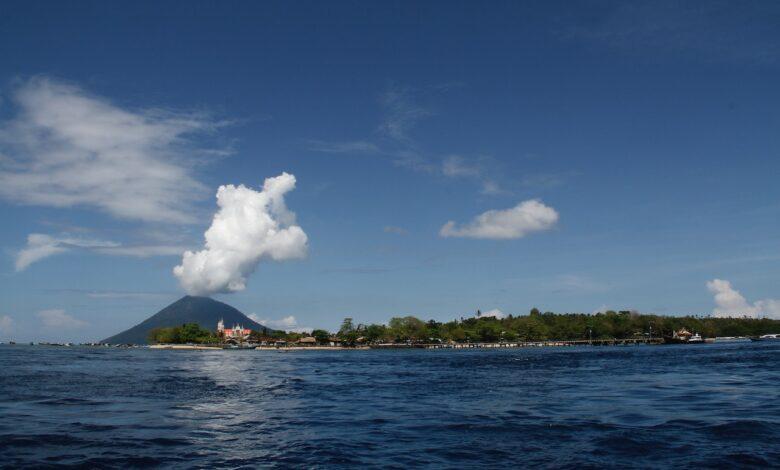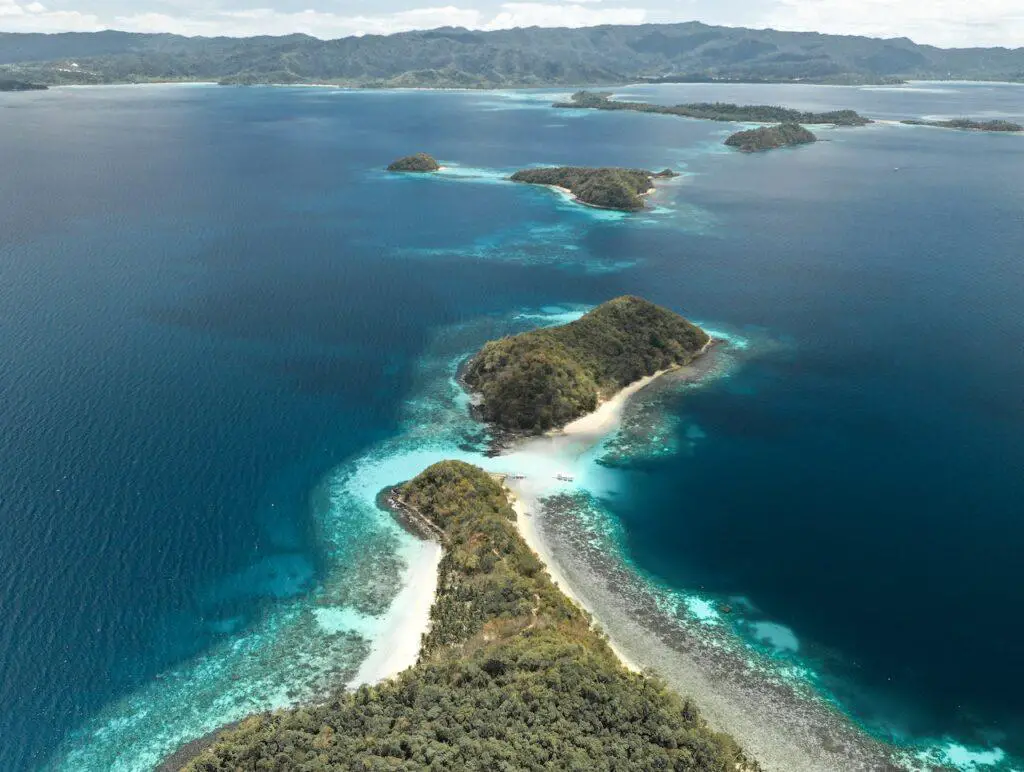🏝️ Hidden Gems of Island Hopping: Exploring Lesser-Known Islands via Ocean Ferries 🚢
Island Hopping Escapade: Unearthing the Secrets of Lesser-Known Islands via Ocean Ferries

Introduction
There’s something truly magical about island hopping—a journey that takes you across the shimmering expanse of the ocean, from one paradise to the next. While iconic islands like Bali, Hawaii, and the Maldives have their well-deserved place in travel brochures, there’s an even more enchanting world waiting to be explored. Welcome to the hidden gems of island hopping, where lesser-known islands offer a unique blend of beauty, culture, and authenticity.
Imagine stepping onto a quiet dock, boarding a rustic ferry, and setting off to explore islands that most travelers have never heard of. This is where the real adventure begins. In this article, we’ll unlock the secrets of island hopping, uncovering the treasures of lesser-known destinations that may not be on your radar.
So, whether you’re an experienced island hopper or someone dreaming of their first island adventure, this article is your passport to uncovering the hidden gems of the world’s less-traveled islands.
The Joys of Island Hopping
The Concept of Island Hopping and Its Appeal to Travelers
Island hopping is a travel concept that entices adventurers and wanderers alike, offering a unique and thrilling way to explore multiple destinations within a single trip. The idea behind island hopping is to journey from one island to another, often within the same region or archipelago. This type of travel provides a perfect blend of relaxation, cultural immersion, and natural beauty, making it an appealing option for travelers seeking a diverse and memorable experience.
One of the primary appeals of island hopping is the opportunity to discover the hidden gems of different islands, each with its own distinctive character. Whether you’re exploring the stunning beaches of the Caribbean, the diverse cultures of Southeast Asia, or the rich history of the Greek Isles, island hopping allows you to indulge in a mosaic of experiences within a relatively small geographical area. It’s an exhilarating way to satiate your curiosity and quench your thirst for adventure.
The Flexibility and Freedom of Island Hopping
One of the most alluring aspects of island hopping is the unparalleled flexibility and freedom it offers to travelers. Unlike traditional travel itineraries that often bind you to a single location, island hopping allows you to be the captain of your own journey. You can choose your pace, the duration of your stay on each island, and even modify your route as you go, depending on your preferences and whims.
The freedom to explore multiple destinations within a single trip means you’re not confined to a single culture or landscape. If you’re an avid beach lover, you can spend extra days basking in the sun and sea on one island, while those with a penchant for history and culture can delve deeper into another. The diverse activities and experiences you can enjoy during island hopping are as boundless as your imagination.
Moreover, island hopping encourages travelers to connect with the locals, fostering a more authentic and enriching experience. You can engage with the people, savor local cuisines, and immerse yourself in the customs and traditions of each island, creating lasting memories and forging genuine connections.
Ocean Ferries: The Ideal Mode of Transport
Advantages of Using Ocean Ferries for Island Hopping
When it comes to island hopping, ocean ferries emerge as an ideal mode of transport for travelers looking to combine convenience, affordability, and a touch of adventure. Let’s delve into the advantages of using ocean ferries for your island-hopping journey.
- Scenic Journeys: One of the most enchanting aspects of ferry travel is the breathtaking scenery. As you hop from one island to another, you’re treated to panoramic views of the open sea, neighboring islands, and coastlines. It’s like a moving window to some of the world’s most beautiful landscapes.
- Flexible Schedules: Ferries typically operate on flexible schedules, allowing you to tailor your journey according to your preferences. Whether you’re an early riser or a night owl, you can find ferry services that align with your ideal travel times, granting you the freedom to explore at your own pace.
- Accessibility: Ferries often dock in the heart of the islands, providing easy access to local attractions, accommodations, and transportation options. This means you can maximize your exploration time and minimize the hassle of getting to and from the ports.
- Cost-Effective: Compared to other transportation methods, such as domestic flights or private charters, ferry tickets are often more budget-friendly. This makes island hopping accessible to a wide range of travelers, from backpackers to families.
- Immersive Experience: Ferry travel allows you to connect with fellow passengers, both locals and fellow travelers. This can lead to shared tips, cultural insights, and even lifelong friendships, enhancing your overall island-hopping experience.
Environmental Benefits of Ferry Travel
In an era where environmental sustainability is a growing concern, ferry travel stands out as an eco-friendly mode of transport for island hopping. Here are some of the key environmental benefits:
- Lower Carbon Emissions: Ferries emit significantly fewer carbon emissions per passenger-kilometer compared to airplanes. They are a greener choice for eco-conscious travelers looking to reduce their carbon footprint.
- Fuel Efficiency: Ferries are designed for fuel efficiency, making them a more environmentally friendly option for transportation over short to medium distances, which are typical of island hopping.
- Reduced Congestion: Choosing ferries over air travel can help alleviate overcrowding and congestion at airports, which can have a positive impact on local environments and communities.
- Promoting Sustainable Tourism: Many ferry companies are investing in eco-friendly technologies and practices, such as using clean fuels, reducing waste, and implementing recycling programs. By supporting these initiatives, travelers contribute to the promotion of sustainable tourism.
- Preservation of Natural Beauty: Ferries allow travelers to appreciate the natural beauty of the sea and islands without disturbing the delicate ecosystems found in these regions. This contributes to the preservation of the stunning landscapes that make island hopping so enticing.
Lesser-Known Island Destinations
Showcase a Selection of Lesser-Known Islands Ideal for Exploration
While many travelers flock to well-known island destinations, there is something special about discovering the hidden gems of the world – lesser-known islands that offer a quieter, more authentic experience. Here, we showcase a selection of such islands that are ideal for exploration:
- Pantelleria, Italy: Located in the Mediterranean, Pantelleria is an Italian paradise often overlooked in favor of Sicily or Sardinia. The island is known for its natural thermal springs, unique dammusi houses, and rugged volcanic landscapes. It’s a haven for relaxation and an exploration of Mediterranean culture.
- Moyo Island, Indonesia: Nestled within the Indonesian archipelago, Moyo Island is a tranquil oasis of unspoiled beauty. With its lush rainforests, cascading waterfalls, and rich marine life, it’s a perfect spot for hiking, snorkeling, and experiencing Indonesia’s authentic village life.
- Bozcaada, Turkey: This charming Turkish island in the Aegean Sea offers a mix of history, culture, and pristine beaches. With its cobblestone streets, medieval castle, and vineyards, it’s an ideal blend of relaxation and exploration.
- Mauritius: While not entirely unknown, Mauritius often gets overshadowed by its more famous Indian Ocean neighbors. This tropical paradise boasts diverse landscapes, including lush forests, waterfalls, and stunning coral reefs, making it a captivating destination for adventure seekers and nature enthusiasts.
Provide Insights into Their Unique Attractions, Culture, and Natural Beauty
- Pantelleria, Italy: Pantelleria’s unique appeal lies in its volcanic origins. Visitors can soak in hot springs, swim in crystal-clear grottoes, and explore the ancient Roman gardens. The island’s cuisine is a blend of Italian and North African influences, offering delectable dishes such as couscous with fish and capers.
- Moyo Island, Indonesia: The lush rainforests and waterfalls provide an enchanting backdrop for trekking and wildlife spotting. The underwater world is equally mesmerizing, making it a prime diving location. The island’s small local population adds to its authenticity, offering a glimpse into traditional Indonesian life.
- Bozcaada, Turkey: This Turkish island is steeped in history, with a well-preserved castle dating back to the Byzantine era. The island is also renowned for its vineyards, producing some of Turkey’s finest wines. Exploring the local wineries and savoring traditional Turkish dishes is a must.
- Mauritius: Mauritius is a cultural melting pot with influences from Africa, India, France, and China. Its natural beauty is showcased in the Chamarel Colored Earths, Black River Gorges National Park, and stunning beaches. Visitors can also explore Hindu temples, taste Creole cuisine, and engage with friendly locals.
These lesser-known islands offer a unique blend of attractions, culture, and natural beauty, making them perfect for travelers seeking an off-the-beaten-path adventure. Whether you’re interested in relaxing on pristine beaches, diving into vibrant marine ecosystems, or immersing yourself in local cultures, these hidden gems promise unforgettable experiences.

Planning Your Island-Hopping Adventure
Practical Tips for Planning an Island-Hopping Trip, Including Itinerary Suggestions
Planning an island-hopping adventure can be both exciting and challenging. Here are some practical tips to help you make the most of your journey and a few itinerary suggestions to get you started:
1. Research Your Destinations: Start by researching the islands you want to visit. Consider factors such as weather, activities, and local culture. Make a list of your top choices.
2. Create a Flexible Itinerary: Island hopping is all about flexibility. While you should have a rough itinerary, be open to changing plans based on your preferences and the advice of fellow travelers.
3. Transportation: Check ferry or boat schedules and book your tickets in advance, especially during peak travel seasons. Ensure you have a good understanding of the transport options between islands.
4. Consider Travel Insurance: Island hopping often involves more transportation and logistics, making travel insurance an important consideration. It can protect you from unexpected cancellations or emergencies.
5. Budget Wisely: Set a budget for your trip and allocate funds for accommodation, food, activities, and transportation. Keep some extra cash for unforeseen expenses.
6. Pack Light: Given the nature of island hopping, packing light is crucial. Choose versatile, comfortable clothing and essential items. Don’t forget essentials like sunscreen, a reusable water bottle, and a first-aid kit.
7. Accommodation: Book accommodations in advance for your first island stop and perhaps your last. For the middle islands, you can be more flexible and book as you go.
Itinerary Suggestions:
a. Greek Island Odyssey: Start in Athens, then take a ferry to the iconic Santorini. From there, explore the lesser-known islands of Naxos and Paros. End your trip in the historic and vibrant Crete.
b. Island-Hopping in Thailand: Begin in Phuket and journey to the stunning Phi Phi Islands, Krabi, and the serene Koh Lanta. Finish your adventure in Koh Samui for a taste of Thai culture.
c. Caribbean Paradise: Start in Puerto Rico and hop over to Vieques, known for its bioluminescent bays. Continue your journey to the beautiful British Virgin Islands, including Tortola and Virgin Gorda.
Advice on Packing, Accommodation, and Budget Considerations
Packing Tips:
- Travel Light: Opt for a backpack or a suitcase with wheels to ease your island-hopping experience. Remember that you might need to carry your luggage from docks to accommodations.
- Versatile Clothing: Pack lightweight, breathable clothing that can be mixed and matched. Consider quick-dry materials for beach days.
- Footwear: Comfortable walking shoes, flip-flops, and water shoes (for rocky shores or water activities) are essential.
- Swimwear and Beach Towel: Be prepared for impromptu beach visits. A quick-dry travel towel can be handy.
- Travel Accessories: Don’t forget your chargers, power banks, and a universal adapter. It’s also a good idea to have a dry bag for protecting your electronics.
Accommodation Tips:
- Booking in Advance: Reserve your first and last-night accommodations in advance to avoid last-minute stress.
- Variety: Mix up your accommodation options – from budget-friendly hostels to cozy guesthouses or boutique hotels – to experience the local vibe.
- Local Insights: Don’t hesitate to ask locals or fellow travelers for recommendations on places to stay. They often have valuable insights.
Budget Considerations:
- Daily Expenses: Plan for daily expenses including food, transportation, and activities. Keep an emergency fund for unexpected situations.
- Exchange Currency: Research the currency used on each island and be aware of exchange rates. It’s often better to withdraw local currency from ATMs.
- Local Cuisine: Savor local dishes at small eateries and street food stalls to save money while experiencing authentic flavors.
- Travel Off-Peak: Consider traveling during the shoulder season to benefit from lower prices and fewer crowds.
With these practical tips for planning your island-hopping adventure, including itinerary suggestions and advice on packing, accommodation, and budget considerations, you’ll be well-prepared to embark on an unforgettable journey of exploration and discovery. Island hopping offers a unique opportunity to experience the world’s diverse cultures, natural beauty, and hidden treasures – all at your own pace.
Experiencing Local Culture
Emphasize the Importance of Immersing in the Local Culture and Interacting with Residents
When you embark on a journey, particularly when island hopping, it’s not just about visiting picturesque beaches or exploring natural wonders; it’s about immersing yourself in the local culture. The richness of your travel experience lies in your ability to connect with the heart and soul of each destination, and that means interacting with the residents.
1. Authenticity: Engaging with local residents is the key to unlocking the authenticity of a place. You get a chance to see the destination through their eyes, understand their way of life, and partake in their traditions.
2. Cultural Exchange: Interacting with locals allows for a beautiful exchange of ideas and traditions. It’s an opportunity for both parties to learn and grow, fostering a sense of global unity and cultural appreciation.
3. Insider Insights: The best travel advice often comes from locals. They can direct you to hidden gems, suggest the most delectable street food, or inform you of unique events and festivals happening during your visit.
4. Memorable Connections: Some of the most memorable moments from your travels may come from encounters with locals. Their warm hospitality, stories, and acts of kindness can leave a lasting impression.
5. Breaking Barriers: By interacting with residents, you break down cultural barriers and stereotypes. You come to realize that, at the core, we’re all more similar than different, regardless of where we come from.
Highlight Opportunities for Cultural Experiences, Such as Festivals and Traditional Events
To truly immerse yourself in local culture while island hopping, you should seek out opportunities to participate in festivals and traditional events. These occasions provide a deep insight into a destination’s heritage and community spirit.
1. Festivals: Many islands around the world boast unique festivals celebrating their culture, religion, or history. For instance, in Bali, you can witness the mesmerizing Nyepi festival, also known as the Balinese New Year, marked by a day of silence and self-reflection. In the Caribbean, you might stumble upon vibrant Carnival celebrations featuring lively music, colorful costumes, and street parades.
2. Cultural Performances: Look for traditional dance, music, and theater performances that showcase the island’s cultural heritage. These events often take place in local theaters, community centers, or even on the streets.
3. Local Markets: Explore local markets, where you can witness daily life and purchase handmade crafts, regional delicacies, and souvenirs. These markets provide a great opportunity for cultural immersion and interactions with the local population.
4. Religious Celebrations: If you’re interested in spirituality, attending local religious celebrations can be enlightening. Witness a traditional Balinese temple ceremony, join a Thai Buddhist festival, or experience the spirituality of the Greek Orthodox Church on one of the Greek Islands.
5. Traditional Art and Crafts Workshops: Some islands offer workshops where you can learn traditional crafts such as pottery, weaving, or painting. Participating in these activities provides a hands-on experience of the local culture.
By actively seeking out and participating in these cultural experiences, you’ll not only gain a deeper appreciation for the island you’re visiting but also create lasting memories that will stay with you long after your journey ends. Island hopping, when combined with a sincere effort to connect with the local culture, becomes a truly transformative travel experience.
Conservation and Responsible Tourism
Address the Importance of Responsible Tourism in Preserving the Beauty of Lesser-Known Islands
Responsible tourism is not just a trend; it’s an imperative, especially when it comes to preserving the pristine beauty of lesser-known islands. These hidden gems often have delicate ecosystems and unique cultures that are susceptible to the impact of mass tourism. Here’s why responsible tourism is crucial for the sustainability of these beautiful destinations:
1. Conservation of Natural Beauty: Lesser-known islands are often characterized by untouched landscapes, thriving marine life, and stunning biodiversity. Responsible tourism practices, such as proper waste disposal and respect for natural habitats, help maintain the beauty of these places.
2. Protecting Local Cultures: Many of these islands have rich, indigenous cultures that need to be preserved. Responsible travelers have the opportunity to engage with local traditions and support cultural initiatives, helping to safeguard these unique ways of life.
3. Minimizing Environmental Impact: Smaller islands may not have the infrastructure to support large volumes of tourists. Irresponsible tourism can lead to overcrowding, pollution, and strain on resources. Responsible travelers minimize their environmental impact, ensuring the islands remain sustainable for future generations.
4. Supporting Local Economies: By choosing local businesses, staying in locally-owned accommodations, and purchasing artisanal products, responsible tourists help boost the local economy. This creates an incentive for island communities to maintain their natural and cultural treasures.
5. Preserving Fragile Ecosystems: Many lesser-known islands are home to fragile ecosystems. Coral reefs, mangroves, and endangered species may be at risk from pollution and habitat disruption. Responsible tourism practices, such as coral reef conservation programs and eco-friendly tours, can help protect these valuable assets.
Encourage Travelers to Support Local Initiatives and Eco-Friendly Practices
As travelers, we hold the power to make a positive impact on the destinations we visit. Here are some ways to encourage responsible tourism and support local initiatives on lesser-known islands:
1. Choose Sustainable Accommodations: Opt for eco-friendly and locally-owned accommodations. Many islands have small, sustainable lodges that contribute to the well-being of the local community and environment.
2. Respect Nature: When engaging in outdoor activities such as snorkeling, hiking, or wildlife encounters, follow all guidelines for minimizing your impact. Avoid touching or disturbing wildlife and corals and leave no trace of your visit.
3. Conserve Resources: Be mindful of your water and energy usage, especially on islands where resources are limited. Shorten showers, turn off lights, and report any leaks or waste.
4. Support Local Initiatives: Seek out and participate in local conservation and community programs. This could include volunteering for beach cleanups, supporting local schools, or purchasing products from indigenous artisans.
5. Choose Responsible Tour Operators: Select tour operators and guides that have a commitment to responsible tourism. Ensure they follow ethical and environmentally friendly practices.
6. Spread the Word: Share your responsible travel experiences with friends and fellow travelers. Social media and personal stories can inspire others to travel responsibly and support local initiatives.
FAQs
Q: Are lesser-known islands more affordable to visit?
A: Lesser-known islands often offer more budget-friendly options for accommodation and activities.
Q: What’s the best time to visit these islands?
A: The best time to visit depends on your chosen destination, so research the climate and weather patterns.
Q: Is island hopping suitable for families?
A: Yes, island hopping can be a fantastic family adventure, providing unique experiences and educational opportunities.
Q: Do I need special vaccinations to visit these islands?
A: Depending on your destination, you may need vaccinations or preventative medications, so consult a travel clinic.
Q: How can I support the local communities?
A: Support the local economy by purchasing locally made goods and participating in responsible tourism practices.
Q: Can I island hop with limited swimming skills?
A: You can still enjoy island hopping without strong swimming skills, but it’s essential to prioritize safety.
Conclusion
Island hopping, with its promise of adventure, discovery, and the thrill of the unknown, is a travel experience like no other. It allows you to step out of your comfort zone, leave the tourist crowds behind, and immerse yourself in the rich, unspoiled beauty of lesser-known islands.
As we conclude our journey through these hidden gems, we hope you are inspired to embark on your own island-hopping adventure. Whether you’re exploring the tranquil islands of Southeast Asia, the uncharted archipelagos of the South Pacific, or any other lesser-known destination, remember that the world’s oceans hide countless treasures waiting to be uncovered.
But with great travel comes great responsibility. As island hoppers and explorers, let us be mindful of the environment, support local communities, and practice responsible tourism. By doing so, we ensure that these hidden gems remain pristine and authentic, ready to be enjoyed by generations of travelers to come.
So, pack your bags, board that ferry, and set sail for the hidden gems of island hopping. Adventure awaits, and the world’s lesser-known islands are calling you to explore, discover, and make unforgettable memories.
UP NEXT
Venice Tourist Guide: Travel Tips and Best Places to Visit in Venice, Italy




Facebook Comments